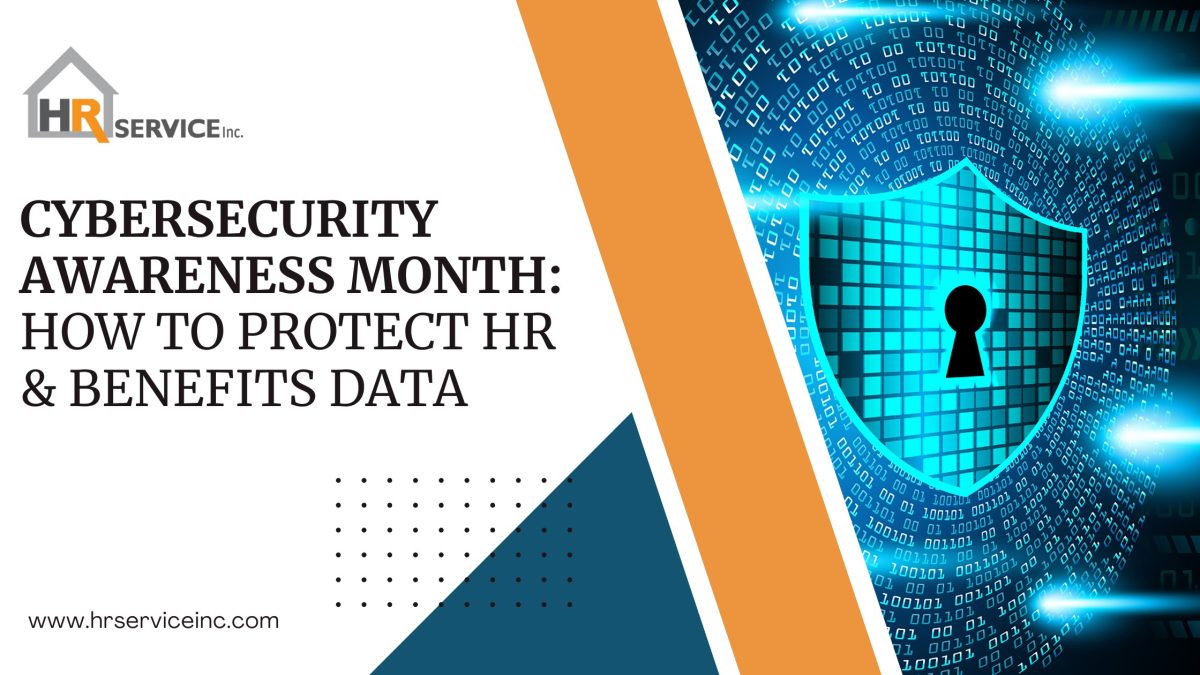Cybersecurity Awareness Month: Strengthening HR and Benefits Data Protection
October is Cybersecurity Awareness Month, the perfect time for businesses to evaluate how they manage and protect sensitive HR and benefits data. While cybersecurity is often associated with large corporations, small businesses and insurance brokers are increasingly becoming prime targets. These organizations typically have fewer resources and weaker defenses, making them attractive to cybercriminals. In the world of Human Resources (HR) and Benefits Administration, where confidential employee and client data flows daily, prioritizing cybersecurity is not optional; it’s essential.
Why HR and Benefits Administration Are Prime Targets
HR and Benefits teams hold a goldmine of sensitive data, from Social Security numbers and home addresses to medical records and bank account details. These teams also rely on multiple third-party systems: payroll providers, insurance carriers, benefits platforms, and background screening services. Each connection creates digital touchpoints that hackers can exploit. For example, if a small HR firm’s email account is compromised, attackers could access client payroll files, tax documents, or insurance enrollment forms. This stolen data can be used for identity theft, fraudulent tax returns, or sold on the dark web.
According to the 2024 Verizon Data Breach Investigations Report, over 80% of data breaches involve the human element, phishing attacks, weak passwords, or mishandled data. HR professionals, who interact daily with job applicants, vendors, and clients, are especially vulnerable to targeted phishing campaigns.
HIPAA Compliance: The Cornerstone of Benefits Data Security
Organizations that handle employee health information must treat HIPAA compliance as both a legal
obligation and a cybersecurity necessity. The Health Insurance Portability and Accountability Act (HIPAA)
establishes strict rules for protecting Protected Health Information (PHI).
In HR and benefits contexts, PHI is commonly found in:
🟧 Health insurance applications
🟧 Claims data
🟧 Wellness program records
Even if your business isn’t a covered entity, partnering with one (e.g., insurance carriers or third-party administrators) classifies you as a business associate, which requires strict compliance. Failing to encrypt PHI or improperly storing it can lead to severe penalties, ranging from $100 to $50,000 per violation and reputational damage.
🟧 Implementing multi-factor authentication (MFA) Encrypting
🟧 PHI during storage and transmission
🟧 Conducting annual risk assessments
🟧 Providing security training for all staff handling PHI
Protecting Payroll Data: Defending Financial Integrity
Payroll systems contain some of the most valuable information to cybercriminals: compensation data, tax records, and banking information. Breaches in this area can lead to fraudulent direct deposit changes, identity theft, and financial fraud.
In one real-world case, a small manufacturer was targeted when attackers impersonated their HR manager and changed multiple employees’ payroll deposit details. Thousands of dollars were rerouted before the fraud was detected.
Recommended payroll data security measures:
🟧 Require verification procedures (e.g., verbal confi rmation) for any bank account changes.
🟧 Choose payroll systems with SOC 2 or ISO 27001 certification.
🟧 Regularly review access controls and apply the principle of least privilege
Practical Cybersecurity Steps for Small Businesses
You don’t need enterprise-level budgets to build strong cybersecurity defenses. Start with these practical steps:
Regular Security Training:
🟧 Educate employees on phishing, password security, and data handling. Run simulated phishing tests.
🟧 Enable MFA: Adds a critical layer of protection against compromised credentials.
🟧 Encrypt Data: Secure sensitive information both at rest and in transit.
🟧 Limit Access: Grant users only the permissions they need, and review access regularly.
🟧 Have an Incident Response Plan: A rehearsed plan minimizes damage when incidents occur.
🟧 Vet Third-Party Vendors: Ensure any vendor handling HR or benefi ts data meets strict security standards and compliance requirements.
Building a Cybersecurity Culture Within HR
Technology alone isn’t enough; people are the first line of defense. Creating a strong cybersecurity culture involves fostering awareness and accountability across the organization.
Leadership should regularly communicate the importance of cybersecurity, perhaps by sharing monthly security tips or highlighting phishing examples. Encouraging employees to report suspicious activity without fear is crucial. Onboarding and annual training programs should also integrate cybersecurity topics, ensuring every employee understands their role in protecting data
The Real Cost of Neglecting Cybersecurity
In 2022, a regional HR consulting firm was hit with a ransomware attack that locked them out of payroll data for nearly a week. Even after restoring backups, the downtime caused payroll delays and lost business. In 2024, a small insurance brokerage suffered a major data breach through an outdated benefits portal, exposing hundreds of client records. Timely security patches could have prevented the incident.
Read more about the Cost of Neglecting HR Infrastructure in out blog Here.
How HR Service, Inc. Can Help Strengthen Your Cybersecurity
At HR Service, Inc., we specialize in supporting small and mid-sized organizations with strategic fractional HR services and robust data protection strategies. Our team helps clients:
🟧 Ensure HIPAA compliance in benefits administration
🟧 Implement affordable, effective cybersecurity measures
🟧 Conduct risk assessments and create incident response plans
🟧 Deliver cybersecurity training for HR and leadership teams
🟧 Vet and manage third-party vendors to maintain data security standards
By partnering with HR Service, Inc., businesses gain expert support to protect sensitive HR and benefits data, maintain regulatory compliance, and strengthen trust with clients and employees.

